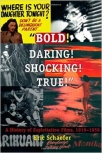During the final weeks of the American presence in Vietnam things turn to chaos, there's a mad scramble to get out and all the Americans make it, leaving a large number of our Vietnamese allies, workers, sources and agents behind. This is a gripping documentary look at the streets of Saigon and the interior of the US Embassy as events first spin and then rip out of control.
Trailer:
Despite its definitely one-sided nature, this movie is worth seeing, if only because of a ton of archival footage from the last days of South Vietnam as an independent nation, covering the final departure of the Americans and a couple thousand locals from the US embassy. Many of the sequences have never been see before.
However, it's kind of surprising -- and disappointing -- that director and producer Rory Kennedy (last child and posthumous daughter of Bobby Kennedy) felt it necessary to give so much screen time to war criminals like Henry Kissinger (who does his best tut-tutting in faux concern for the people of South Vietnam that were left behind), and later (Bush II) Deputy Secretary of State and traitor Richard Armitage (he was the one who publicly outed Valerie Plame), and too little to people like Frank Snepp, who was actually there and really knew what was going on.
There's a lot said in this movie about the ruthless North Vietnamese but nothing about the equally ruthless Saigon commanders. There's also practically nothing about the CIA -- although Armitage himself had likely been working with them earlier in the Phoenix Program -- and they were the ones actually in charge in Saigon in the last months before the bug-out.
Graham Martin was the US ambassador on the scene, who unrealistically, even neurotically, tried to believe that an evacuation was not necessary, until he was finally convinced by the events, at the very last minute, thereby dooming any number of South Vietnamese who thought they were our allies and we would get them out. He comes off in this movie as not a bad guy, really, just someone who was in over his depth, a borderline doddering old man who just didn't quite "get it". Frank Snepp in his seminal work, Decent Interval also had something to say about Martin, but he was unsentimentally harsh in his descriptions.
Need I add that Martin, along with Kissinger and Armitage, were all Republicans? The Republicans were the ones who were supposed to have secured "peace with honor" in Vietnam. They were the ones who secured that peace accord in Paris with an assurance to South Vietnam that, "Sure, we'll be right back if the North Vietnamese break the agreement. Now sign here."
Monday morning quarterbacking holds that the North Vietnamese had a healthy fear of what Richard Nixon was capable of and did not really want American firepower released on their country again. But that was rendered moot when Nixon was forced out of office by Watergate, and Gerald Ford, although a long-time enthusiast for the war (and noted bumbler), was incapable of coming up with any kind of action plan.
A scant two weeks before Saigon fell, he asked Congress for $751 million in military aid for South Vietnam, to resist their "aggressive foes from the North" (who by that time were about 40 miles from Saigon), but it was too little, too late and Congress did not allocate the money. Maybe if Ford had faced reality, owned up to the facts, and asked for the "humanitarian aid" necessary to evacuate as many South Vietnamese as possible, he would have been more successful. But Ford, like Martin, was neurotic and obsessive about not "losing" the war, and that would be seen as "giving up"...
For his part, the cynical Kissinger had no intention of upholding the commitments in that agreement. But neither did South Vietnam's president/strongman Nguyen Van Thieu, who barely waited 24 hours before he broke the agreement with an attack on some North Vietnamese positions.
For some unknown -- and unfathomable -- reason, Kissinger and North Vietnamese diplomat Le Duc Tho shared the 1973 Nobel Peace Prize, but at least Le had the good graces to decline it.
All in all, this movie was an unsatisfying look at the history and politics surrounding the fall of Saigon. Rory, Rory. I really would have expected better of you.
Still, the movie is worth viewing just for all the unseen videos of the last chaotic days, the last helicopters out, the South Vietnamese choppers full of refugees making surprise landings on the Navy ships off the coast, and the heartbreak of all the people who were left behind. Especially the last 450+ who were already in the embassy grounds and were repeatedly assured (i.e., lied to) that they would be evacuated.
All you need to do when you are watching it, if you don't want to get pissed off, is fast-forward past that ugly mug of War Criminal Henry Kissinger and that bald round Mussolini-head of Traitor "Dick" Armitage.
Yeah, I think I still have some issues...
More reading:
- Last Days in Vietnam on Netflix
- Last Days in Vietnam on the IMDB.
- Last Days in Vietnam on Wikipedia
- How Rory Kennedy’s ‘Last Days in Vietnam’ Distorts History by Nick Turse, The Nation magazine, Feb 4, 2015, a no-punches-pulled review of the film.











0 Comments:
Post a Comment